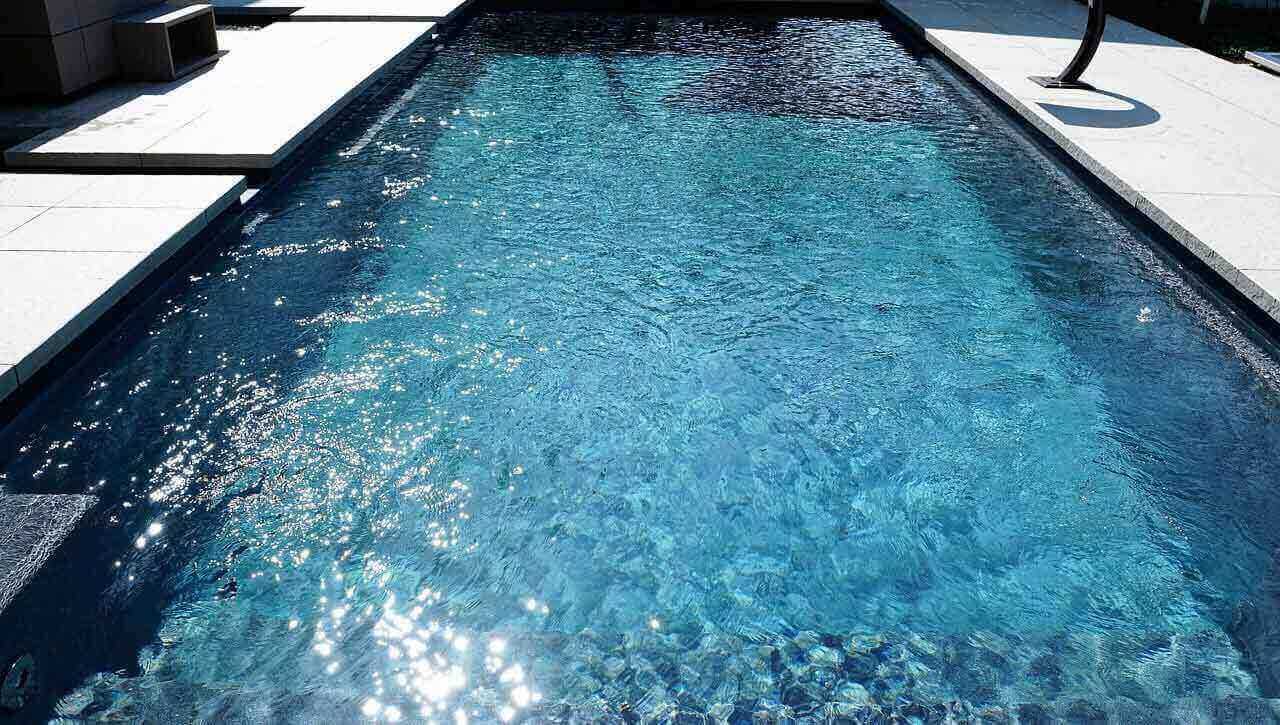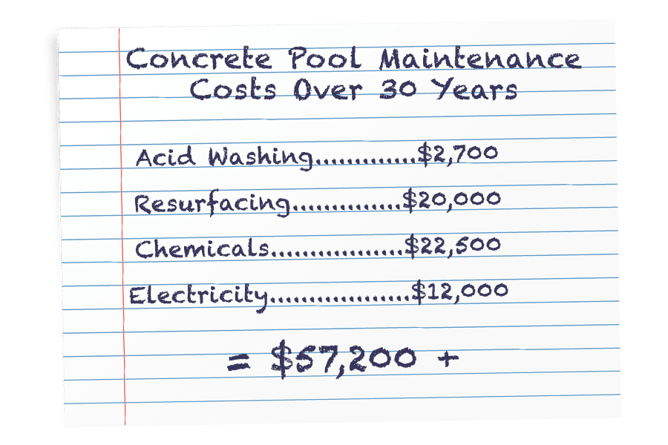
8 Things You Must Know Before You Build a Concrete Pool
Installation & Construction | Concrete Pool Information
Do you have plans to build a concrete pool?
First of all, we want to congratulate you on taking your first steps towards getting a new swimming pool for your home! Nothing compares to the joy and fun that a pool can bring to the whole family, and that's why we continue our work of manufacturing fiberglass pools year after year.
But before you build a concrete pool, we encourage you to do your research so that you can know exactly what you're getting.
As one of the top producers of pool ownership resources in the world, we'll share a few things that you need to know before you make any major commitments to your pool builder.
Here are some of the main concerns that concrete pool owners have reported to us.
1. Concrete pools take a long time to build
Concrete pool construction, which typically involves the gunite process (click the link to see how it works) can take anywhere from 3 to 6 months on average, and it can drag on longer if the weather is unfavorable or your builder runs into delays. And even if you're not in a rush to get your pool in the ground before the next swim season, your yard is going to be in total disarray with a team of workers continually coming and going.
Concrete pool construction is also loud. The air compressors that are used to apply the concrete to the rebar frame can go above 85 decibels, which can damage your hearing. Lucky for you, that part only lasts a few days, but the construction is still noisy overall.
2. Concrete pool construction is hands-on
Even if you didn't want a DIY concrete pool, you'll likely have a hand in the building process before it's all over. Specifically, most concrete pool owners have to spray down their concrete pool surface 2-3 times a day for 28 days while the concrete is curing.
Typically, your pool builder will expect you to do this part since going to your home several times a day can become costly for you and time-consuming for them, especially if they have other projects to work on.
3. Concrete pools are the most expensive inground pools to build
Concrete pools usually cost a minimum of $50,000 and can easily go all the way up to $100,000 or more. If you love how a concrete pool looks and want a highly customizable design, concrete is obviously the best choice for you. But if you weren't aware that you had other options, we want to let you know that yes, you can get a more affordable inground pool if your budget is stretching too thin.
Vinyl liner pools are much cheaper than concrete pools at around $35,000 to $65,000, but they're also less durable. A fiberglass pool might cost less than a concrete pool overall, but it will likely be more expensive than a vinyl liner pool. (You can download our free ebook below for an in-depth comparison of the three main inground pool types, including pricing, designs, and benefits.)
4. Concrete pools are expensive to maintain
Plaster is porous and coarse, and it can lead to challenges with pool chemistry. Maintaining your pool surface might include running the filter for longer periods (higher electricity costs) and MUST include diligent use of the correct chemicals.
Resurfacing the pool in plaster, aggregate, or tile should be planned for about every ten or so years, and it won't be cheap. Over a 30 year period, you might spend more than $50,000 on maintenance alone.

5. Concrete pools can pop out of the ground
Yes, any pool can float, but there's a widespread misconception that concrete pools can't float because they're too heavy. This is far from the truth, and we want you to be aware of this possibility before you build your pool so that you can avoid this type of catastrophic damage.
To prevent your pool from ever floating (especially if your area has a high water table), be sure that your builder installs a hydrostatic relief valve, and avoid draining your pool and leaving it empty. If you want to drain your pool, consult with a professional first.
6. Concrete pools are algae-prone
Let's be clear, you will have to deal with algae at some point no matter what type of pool you choose. If you decide to go with concrete, it will likely be difficult to get rid of algae.
Like we said, plaster is porous and bumpy, and it creates the perfect atmosphere for algae to thrive. Concrete pool walls require weekly brushing with a steel brush, lots of filtration time, and the right amount of chlorine to keep the algae at bay. Skip out on these chores, and you'll be sure to have a green pool in no time.
This time-intensive maintenance is one reason why so many concrete pool owners choose to hire pool maintenance professionals to take care of their weekly chores. A pool servicer will make your life easier, but it can come at a cost of about $2,000 to $3,000 per year depending on how long your pool is open for the season.
7. Salt can wear down plaster quicker
Thinking about using a salt system for your pool? Salt is abrasive, and over time it can wear away at your pool plaster. The salt won't directly harm the plaster as concrete pools and salt systems are compatible, but it can speed up normal wear and tear, which might mean that you need to resurface your pool more often.
Why do we focus on plaster so much if there are other concrete pool surface options? Plaster is the most popular and affordable surface choice for concrete pools by far, and it's likely that you'll have plaster in your pool, too (aggregate uses plaster as well, but it's a little bit more durable than a bare plaster surface).
Read more: Are Salt Water Systems Bad for Concrete Pools?
8. Concrete pool surfaces are rough
Have you ever scraped your toe on the wall or floor of a swimming pool? Yeah, that doesn't happen in vinyl liner and fiberglass pools, but concrete pools are almost guaranteed to give you scrapes at some point (it can even scratch up accessories and watch faces).
Both plaster and aggregate surfaces can be rough for walking and sitting, and exposed pebbles can be uncomfortable on the feet, especially if they're large. Tile is a much smoother surface, but it's also very expensive (we're talking up to $50 or more per square foot).
Want to explore the pros and cons of vinyl liner and fiberglass pools before you make your final decision? Here's a brief overview of each:
Vinyl Liner Pools
Vinyl liner swimming pools are waterproofed using a vinyl pool liner and are generally regarded as the most inexpensive inground pool type. They require regular liner replacements, which can get costly, but it's not as expensive as maintaining a concrete pool. Vinyl pools are comfortable for walking and sitting and smooth to the touch, but they can also tear easily, which can lead to leaks. Read more about the pros and cons of vinyl pools here.
Fiberglass Pools
Fiberglass pools usually cost less than concrete but more than vinyl liner pools, but they also cost the least to maintain. The surface of a fiberglass pool is durable, smooth, and algae-resistant, which means savings on chemicals and electricity. Typically, you won't need to resurface your fiberglass pool over your pool's lifespan if you maintain it well. You can read more about the pros and cons of fiberglass pools here.
Questions or comments? We'd be happy to address any concerns you may have about inground pools in the comments below.
At River Pools, we manufacture world-class fiberglass pools for customers across North America. If you'd like to explore your fiberglass pool options, you can browse our pool models, request a quote from us, or try out our pool pricing calculator tool for an instant estimate:

Want to see about how much your fiberglass pool will cost with all your favorite accessories?
Use our Design and Price Tool to walk through your options and approximate price!
Up Next:
6 Things You Must Know Before You Buy an Inground Pool
Ultimate Pool Planning Guide: 11 Things to Consider Before Installing an Inground Pool






